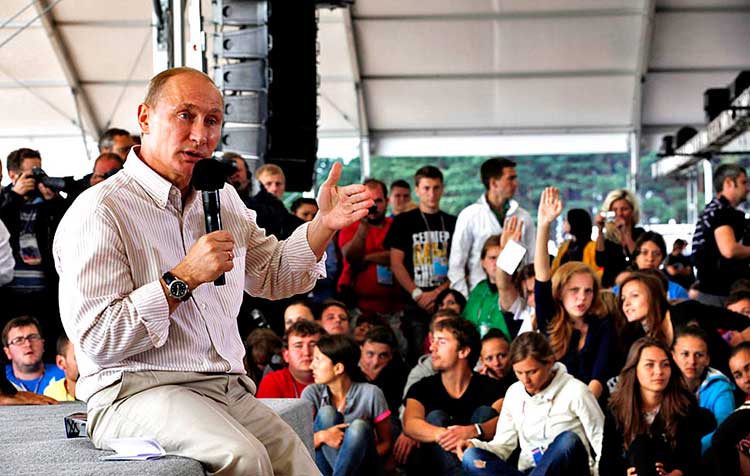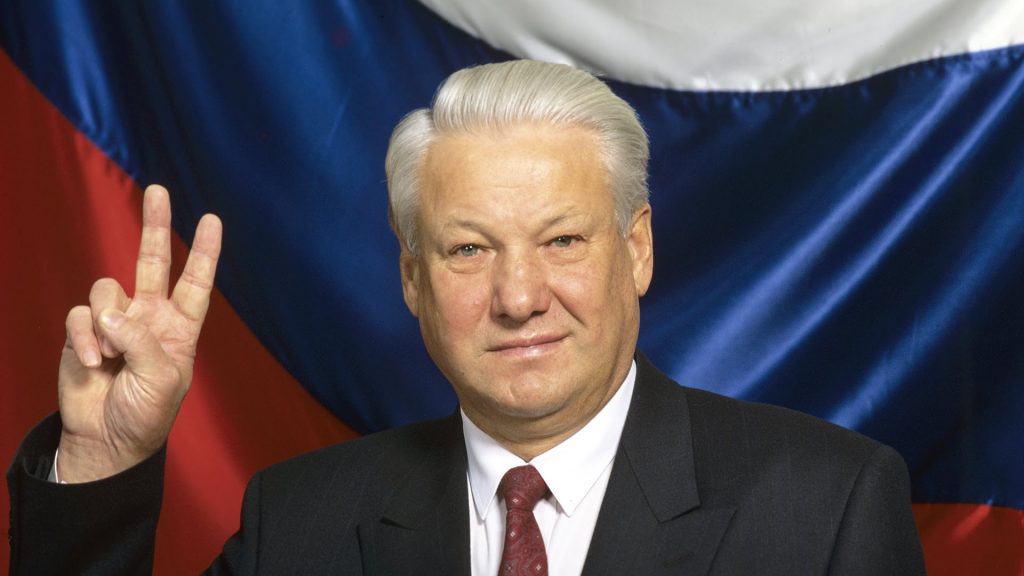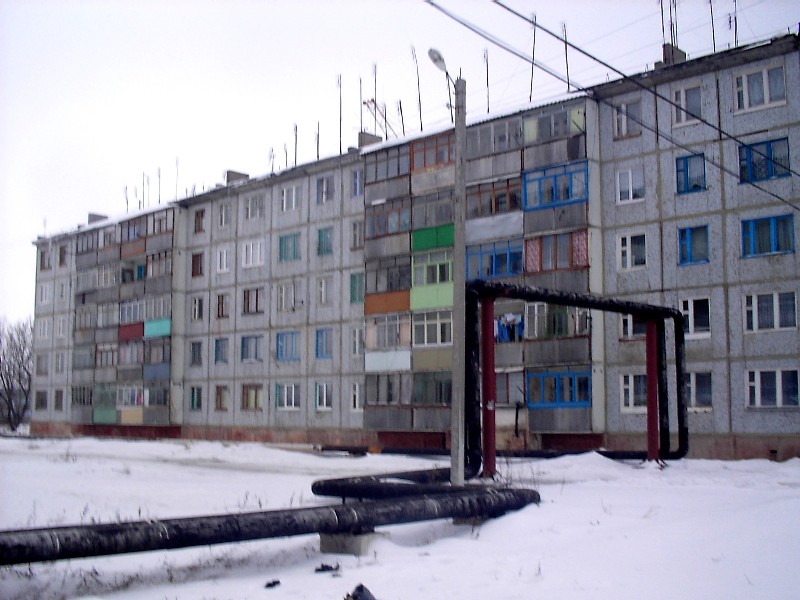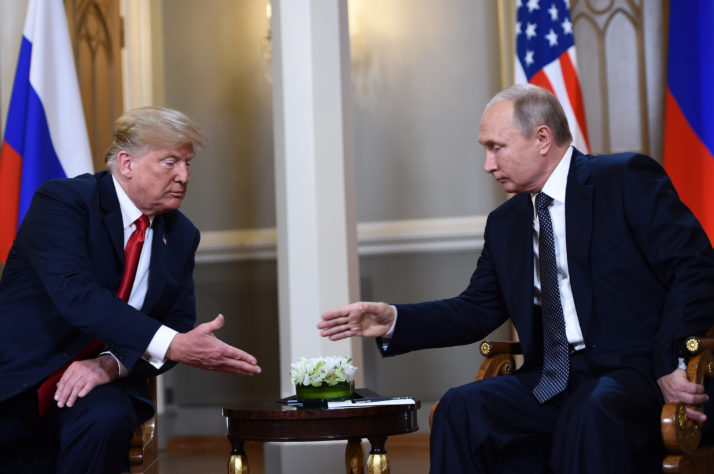
I find two things that catch my eye this morning. One is an article in the Moscow Times, a liberal English language newspaper written for Moscow expats, the other, a website sent to me by my friend, Alexey Vasilyev. They are of interest to me because they deal with what might be called the “Putin Generation” – those young people under the age of 20 who have never known another leader but Putin, nor another Russia other than the Russia he has built. It is this generation that I know best because, over the course of the last ten years, I have taught thousands of them. I know them well, perhaps even better than those close to them, because I do not see them through eyes that often overlook what they have become too familiarized with. I see them through eyes that perceive them from another dimension; eyes that constantly compare them to American children; the eyes of a professional teacher who constantly weighs and evaluates them; the weak but wise eyes of an old Babushka. And I want you to know, am not in fact the least bit ashamed to say, that I count many of them among my dearest friends.
The Moscow Timesarticle is a superficial bit of fluff; filled with pictures of modern youth. The piece Alexey has sent is far more interesting (https://yunarmy.ru/). It is about a youth army that has been formed to fill young people with feelings of patriotism and service to country. For those of you who have trouble reading Russian)), there is an article from the New York TimesI referenced just a few minutes ago, (https://www.nytimes.com/2018/03/22/world/europe/russia-soviet-youth-army.html?mtrref=search.yahoo.com&gwh=4A63C301902E40107A08B0AE8AEEC21B&gwt=pay).
But it is not these articles that I want to talk about; after all I know these people very well and in all my arrogance, do not think that anyone can tell me anything about them that I don’t already know. And what is it I know? Well, they are very much like Putin himself, and Putin himself is very much a typical Russian. What exactly do I mean by that? Well, there are three things that I think are hallmarks of the Russian character. The first is the core role that friendship plays in social relations. The second is a work ethic that makes the Protestant Work Ethic pale by comparison; Russian children are expected to work beyond the point of exhaustion as they struggle to constantly improve themselves. The third thing is a far more difficult thing to put into words. I could say it is a softheartedness that finds the suffering of others unbearable. I could say that that feeling transforms into a revulsion against injustice. One could say that they are filled with liberal democratic values.
The complaint is leveled, both by Americans and by Russians themselves, that Putin has not only filled his government with his old friends from his childhood and university days in St. Petersberg, from his days with the KGB in Dresden, from the Lake community where is his dacha is, but has also given them opportunities to become wealthy. Arkadi and Boris Rotenberg, his judo partners when he was younger, became billionair contractors who were awarded choice government contracts. I am fond of saying that the difference between America and Russia is that in America the people with money determine who gets political power while in Russia, the people with political power determine who gets money. One cannot understand Vladimir Putin, nor Russians in general, nor this young generation of under 20s, without understanding that friendship and loyalty shape their lives and actions.
When I first watched these young Russians interact with one another, I was struck but two things: first how genuinely happy they were to see one another. Each boy shook hands with every other boy, each girl hugged every other girl and boy. The physical and psychological abuse and aggression that is so typical of American students’ interactions with one another, is nearly non existent here. If someone does or says something “wrong” they are quickly chastised by the group, but it is done openly, without hatred, and quickly passes. The second thing is that one’s devotion to one’s friend has very few limits. Honesty and integrity are defined not by abstract principles, but in terms of helping one’s friends. So it is that “cheating” is not taken very seriously; nor does one object to letting others copy one’s work. Despite every effort to prevent or punish cheating, the students continue to do so. I know that many students send their homework via email to others in their class. They do so, as they themselves tell me, because they should help their friends.
Russian students are driven by their teachers and their parents, without pause or mercy, to, in the words of Rudyard Kipling, “…fill the unforgiving minute With sixty seconds’ worth of distance run.” Until very recently, Russian schools operated six days a week. A huge amount of homework is given, so much homework that they often were up way past midnight getting it done. It usual this that students are so tired that their heads often nodded in class. And as if this wasn’t enough, there are the extra classes- English of course. The average Russian child begins to study English at the age of 6 or 7. The current trend for the middle classes, is to send them to English nursery schools. By highschool they will undertake the study of a third language. In addition the vast majority of them will be expected to play a sport or engage in a physical activity of some kind. Many will take music whether they want to or not. So, the average week for a Russian child of middle class parents, is filled with study of one sort or another as they move from classes to tutoring lessons or some other training. Hour after hour, day after day, week after week, they are driven to constantly expand their abilities, to master new subjects, to excel. If they do not do what is expected of them their parents and teachers will call them “lazy”. It is the most common adjective that is used in regard to Russian students.
I had one little girl who told me she was very “lazy”. I asked her what she meant by that. She responded that when she went home after school she liked to just lay still and do nothing for a half an hour.
So when you hear Vladimir Putin speaking fluent German in a speech before the German people, or singing “Blueberry Hill” in English, or riding his motorcycle, or doing Judo, or working out with weights, or fishing, or riding bareback through the Taiga, do not be impressed. He is but a typical Russian, the product of a typical Russian education. Say what you want about him, he is not lazy.
Teachers are held in high esteem here in Russia. A good teacher is worshipped. This is not to say that Russian children are not “badassed”. Indeed they are, the overwhelming pressure put on them to work and perform, combined with their deep feelings of attachment to one another, very often turns the classroom into a “playground”. They want to play with one another, and this makes it hard to keep them under control. But underneath it all, they are obedient and will do what they are told when it comes to learning. If they get a bad grade, they will apologize for their poor performance. This Russian reverence for one’s teachers is evidenced in Vladimir Putin. When he went to Israel he visited his old high school teacher, Maya Yuditskaya Berliner. Seeing that she was living under difficult conditions, he bought her an apartment. He is equally devoted to his judo coach, Coach Rakhlin.
Russian students are kind hearted in a way that I cannot explain to you. Violence, injustice, other’s pain, touches them to the point of tears. Although there are those who would argue that Russia is not a democracy, it has produced a generation of young people who embrace with their hearts democratic values. For some, this takes a nationalist turn, as they rage at America’s unjust treatment of their own country; at its hypocracy and international cruelty. They are patriots. For others, a small minority, they see in the “crony capitalism” and centralized power of Putin’s Russia, injustice, inequality, the absence of all those “liberal” values that seem to flow naturally from their hearts. For them there are two ways out. The first is to escape Russia. These are the students who will take their fine Russian educations and go to study in England or America. They will probably never come back. There are many such people, young and older. They are the nucleus of the Russian “brain drain.” I tell them, I tell them quite honestly what life in America is truly like: the crime, the violence, the racial tensions that they cannot possibly imagine, the police brutality, the way politicians are bought, the rising divide between rich and poor, the poverty, the homelessness. They are surprised by what I say, but I don’t think it truly impacts their desires to leave.
For others, without the funds, opportunities or desire to leave their country, their hopes rest on Alexei Navalney, the often arrested, always verbal, sometimes silly, leader of the “opposition” as it is called. To my mind, while Navalney is very good at criticizing and finding out details of “corruption”, he has not one quality or credential that would enable him to lead Russia. He would hold up the doors of his homeland to American corporations and smile while they ate his country for lunch. All I know about American foreign policy which is characterized by regime change, and that is quite a bit, leads me to believe, as does Mr. Putin, that the opposition is supported and funded by America. However, for Russians opposed to Putin, it is an insult to suggest this for that would mean that their complaints were not valid, and their actions not self motivated.
So a few days after the election I sit across the table from one of my sweetest students. She is shy and socially ill at ease, But she is bright – another shining star of the Russian educational system, and she has been accepted to an elite private school in England. She is a Navalynist. I bring up the Russian elections; the monumental support that Putin received at the polls. She informs me that that was only because Navalney did not run. Had he run, she tells me, he would have received 30% of the vote. She will leave Russia at the end of the summer in all probability, never to return.
But by and large the young are patriotic Putinists who will, if they have one moment of free time to spare, join the youth army.
Mary Metzger is an New Yorker living in Moscow

















































